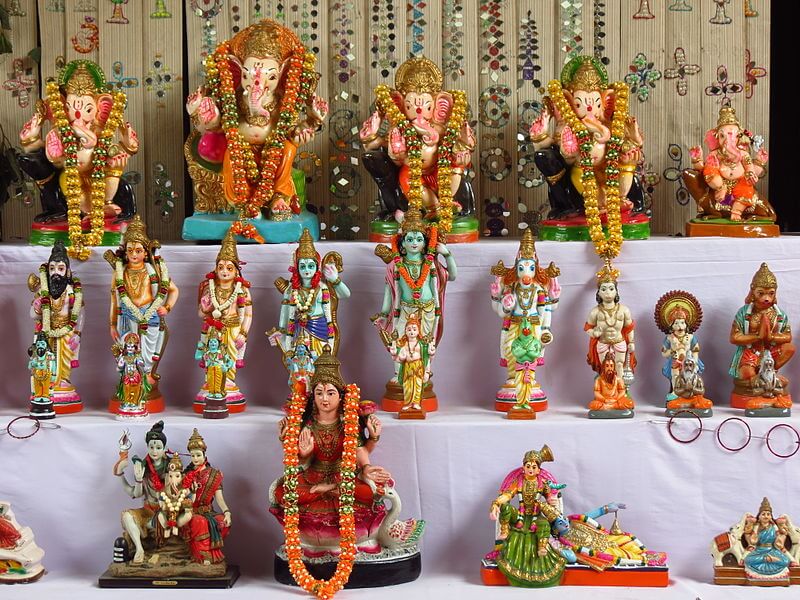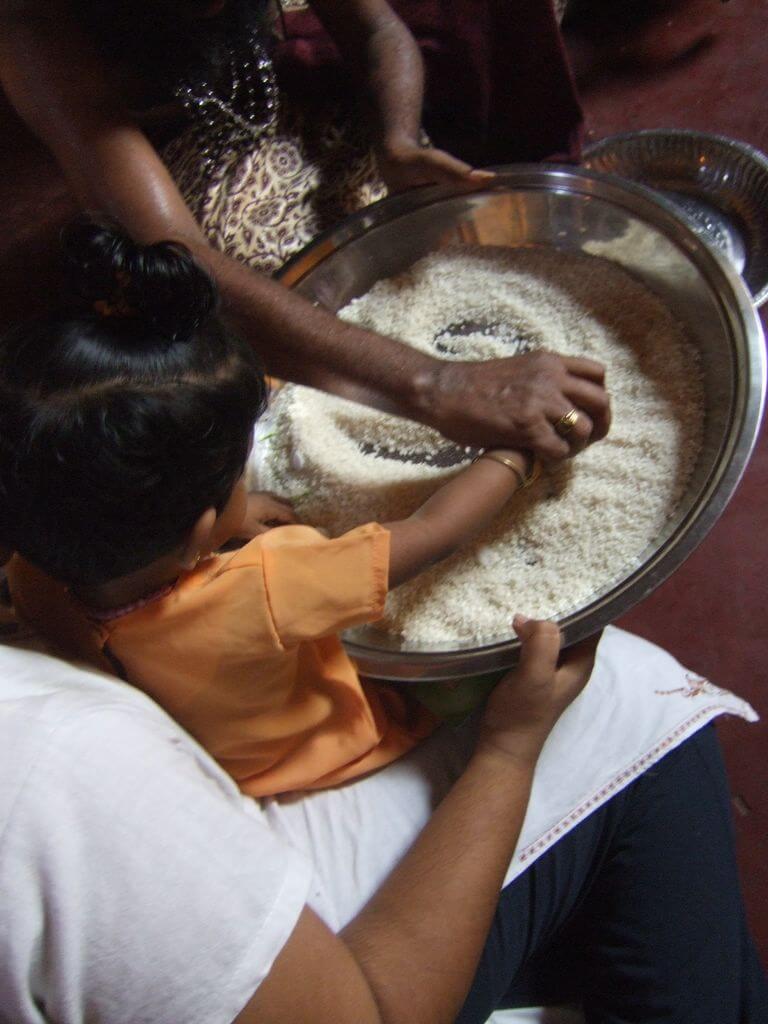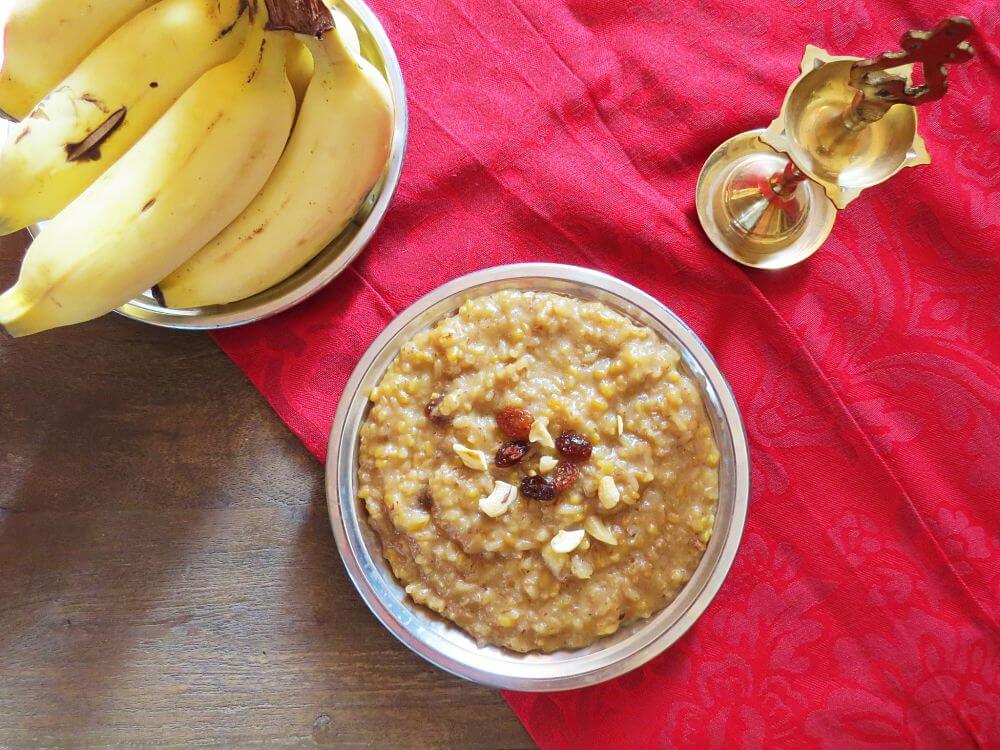Having grown up in a Hindu household, Navarathri was always a big deal. I have fond memories of my mother preparing jaggery pongal (sweet rice), sundal (tempered chick peas) and aval (sweetened rice flakes), decorating the idols with fresh flowers, and singing devotional hymns. Religion and culture were always important to my parents and although we were born and raised in foreign soils, they made sure that we held on to our roots by taking part in religious holidays and traditions.
Just as it was important to my parents to instill culture into us, it is equally important to me that my children learn to carry on our traditions. We celebrate Navarathri as a family and since prayers are in the evenings, it makes this possible. Each year the kids help me prepare for the evening prayers by washing flowers and helping prepare the naivedyam (divine food offering). We light the villaku (lamp), decorate our idols with fresh flowers, offer naivedyam, and pray while devotional songs play in the background.
In wanting to teach my children about Navarathri, I have read and learned a lot about this festival. I came to realize that the rituals and the types of foods that are offered usually vary from region to region so I mainly stick to the same way my parents chose to observe Navarathri - not because I believe it is the right way (because there is really no one way) but because that is what has been passed down by my generations before me.
Navarathri, which literally means "nine nights" in Sanskrit, is one of the most important festivals celebrated by Hindus. The nine nights festival marks the beginning of Autumn, usually falling in either September or October, but actual dates change annually according to the lunar calendar. The beginning of Autumn is seen as an ideal time for worship because Autumn brings with it both solar influence and climate change which can negatively affect us all as individuals.
During Navarathri, the Mother Goddess is thanked for keeping the universe in balance and for bestowing upon us the power to maintain our physical and mental health. Legend also has it that the festival of Navarathri came into existence as a celebration of good over evil after the Mother Goddess destroyed an evil demon king following ten consecutive days of fast. The nine nights are dedicated to the Mother Goddess who represents energy, nature, fertility and the bounty of the Earth.
The various aspects of the Mother Goddess is adored through the worship of the three goddesses: Durga, Lakshmi, and Saraswathi, respectively. Each night, the Goddess being worshipped is offered naivedyam and devotional songs are sung. Some set up a place of worship/figurine display called golu consisting of various idols of Gods, Goddesses, men, women, children, animals and plants. The golu traditionally is made up of nine steps to represent the nine nights of Navarathri.

Durga is celebrated the first three nights for her strength and courage. She is said to remove all impurities from her devotees. The next three nights are devoted to Lakshmi as devotees pray for blessings of wealth and prosperity. Saraswathi is celebrated during the final three nights as devotees pray for wisdom and knowledge.
On the ninth and final day, Sarawathi Pooja,is held in homes, schools and temples. A feast of pongal, sundal, aval, vadai (spicy doughnut) and fruit is offered to the Goddess, and books and instruments are placed in front of the Saraswathi idol to invoke her blessings. In order to pray for success, the blessings of all three Goddesses are needed - hence the celebration and worship of courage, wealth and wisdom.
The day following Saraswathi Pooja (or the 10th day of Navarathri) is referred to as Vijayathasami, and it is regarded as an highly auspicious day. It is customary for children to be taught to write their first few letters in a platter of raw rice either at home by an elder or at the temple with an iyer (priest). Vijayathasami is also regarded as a good day to start new ventures. Diwali, which is commonly known as the festival of lights, usually occurs 20 days after Vijayathasami.

Although traditions vary from region to region or even from home to home, some things remain the same. Before the beginning of Navarathri, the home is thoroughly cleaned and during Navarathri devotees refrain from eating meat. Naivedyam is only prepared by those who have showered. Naivedyam, whatever it may be, must be vegetarian and not contain garlic or onion. According to Ayurveda, garlic and onions are tamasic in nature which means they increase passion and ignorance. If fruit is being offered as naivedyam, it should be washed, sprinkled with water, and only offered in odd numbers. Common fruits used for offering include: apple, grapes, pomegranate, mango, jackfruit, banana, and coconut. The black ends of bananas are commonly cut off before offering to God or using in any religious ceremonies.
The naivedyam should not be eaten or tasted before offering to God first as we prepare the offering for God's satisfaction and not our own. It is also important to prepare offerings in a calm and peaceful state with clean utensils used only for the preparation of vegetarian meals. Lastly, the naivedyam should only be offered on a plate reserved for offering food to God.
Once the offering and prayers are complete, the prasadam (food that has been accepted by God) can be enjoyed by all. In Sanskrit, "prasada" means mercy and by eating the prasadam ignorance is removed and the results of sins we have committed in our pasts are said to be destroyed. Essentially by honouring the prasadam, we are spiritually enlightened and given new life.
 Happy Navarathri to all those celebrating! May this festival bring happiness and prosperity into the lives of you and your loved ones.
Happy Navarathri to all those celebrating! May this festival bring happiness and prosperity into the lives of you and your loved ones.
My recipe for jaggery pongal can be found here. I will be updating my blog with recipes for sundal and aval during this week.
This article first appeared on moderndaybrownmom.com.

























